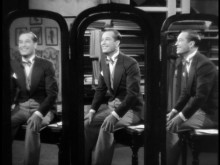
We’re screening Rouben Mamoulian’s Love Me Tonight—the 1932 Maurice Chevalier musical comedy—on Tuesday at the Asheville Film Society (in the Cinema Lounge at The Carolina at 8 p.m.), an event that helped bring to mind the question of divorcing the experience of seeing a movie from the movie itself. In other words, is it really possible to completely separate one’s feelings about a film from the circumstances—audience, format, presentation, etc.—under which it was seen? I’m neither sure that it is, nor am I certain that it’s necessarily a bad thing in some respects.

Movies, after all, are intended to be a communal experience. They were meant—like nearly all entertainment—to be shared with an audience. Comedies are funnier with a receptive audience. Horror movies are more enjoyable when everybody jumps at once. There’s even a vibe to other kinds of movies. Would I have written the following about Paradise Now (2005)—“the film boasts an ending that leaves the audience sitting in numbed silence—you get the feeling it would be disrespectful to move or make a noise”—had I seen it alone? Would I even have had that sense? I can’t say because that was my experience—and the memory of that experience would almost certainly color any subsequent viewing.
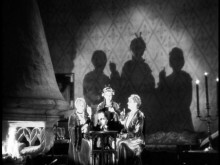
I know there are those who prefer the idea of seeing a movie in relative isolation. I understand the idea, but
I don’t really subscribe to it. Yes, a bad audience—and God knows, there’s no shortage of those—is a detriment to the experience. (Only today, a refugee from a 1950s laugh-track was seated behind me at You Again and it did not enhance the experience—except perhaps as a sociological study.) However, that kind of audience isn’t likely to be at a movie like Paradise Now, nor are they likely to be present at a showing of an older movie in a rep or art house presentation. And that brings us to the question of my feelings about Love Me Tonight.
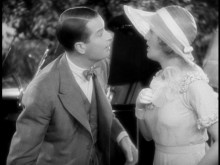
I’ve mentioned my first exposure to the film before, but let me put this into context. It was 1971 and I would have been 16 at the time. Around that time four of Rouben Mamoulian’s best films (actually, Mamoulian’s four best films)—Applause (1929), City Streets (1931), Dr. Jekyll and Mr. Hyde (1932), Love Me Tonight—had enjoyed a successful retrospective in New York. And, as often happened in the wake of such events, a package of 16mm prints of those titles was out together and made available for colleges. That package made its way to the University of South Florida in Tampa, and from there to me.
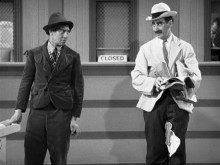
This just happened to come about at the same time that my father discovered that movies like this were listed every Friday in the Tampa Tribune. In fact, he had surprised me a bit earlier by taking me to St, Peteresburg Junior College for a showing of the Marx Brothers in A Day at the Races (1937). The first two films didn’t mean anything to him (and wouldn’t have meant anything to me at the time), but the Dr. Jekyll and Mr. Hyde listing caught his eye. However, it was on a double bill with Love Me Tonight. Well, Tampa was 65 miles away and it was a school night for me and a work night for him, so he agreed we could go, but that we could only watch whichever was first—and Love Me Tonight was listed first.
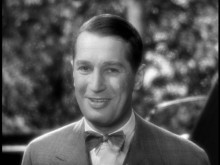
Now, I was already pretty obsessed with movies by this age, but the idea of filmmaking was still a little on the formative side for me. I hadn’t read a lot about movies by then because there wasn’t that much readily available. I’d put together on my own that horror pictures directed by James Whale were different from those directed by—well, anyone else. I’d noticed that Leo McCarey’s Duck Soup (1933) was in an altogether different realm than all the other Marx Brothers movies. But I still primarily thought in terms of the in-front-of-the-camera talent. I’d never even heard of Rouben Mamoulian. I didn’t know why the (as I thought of it then) Fredric March Dr. Jekyll and Mr. Hyde was being paired with this Maurice Chevalier movie.
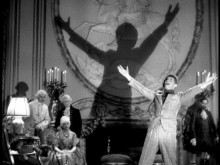
And then there was the idea of a Maurice Chevalier movie. A what? Like most kids of my generation, Maurice Chevalier was defined as this old duffer in rubbishy Disney movies like In Search of the Castaways (1962) and, worse, Monkeys Go Home (1967). The idea of a young (comparatively, since Chevalier was pushing 44 when Love Me Tonight was made), engaging,, funny, sexy Chevalier was a wholly foreign concept. With that in mind—and the legendary status of the Fredric March Jekyll and Hyde—I was living in hope that the order of titles was listed wrong in the paper. And after all, the fact that they were chronologically out of order made that seem likely. Right? Well, no.

To bring this back to the original point, the upshot was that this is where the concept of filmmaking really fell into place for me. I might have sat there cheesed at the knowledge that I was going to miss Jekyll and Hyde for a good three minutes before I was fully hooked on how this movie was made. Much as I found I loved Chevalier and the witty, wildly pre-code script, the supporting cast and the non-stop parade of terrific songs by Richard Rodgers and Lorenz Hart, it was clear to me that what brought it all together was the director—this Rouben Mamoulian fellow. It changed the way I looked at movies for all time—and set me on the path that brought me to where I am at this moment. Whether or not that’s a good thing will be a matter of opinion.
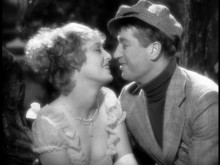
In the space of 90 minutes, I got the best education in filmmaking technique I’d ever seen. Had I seen that most essential of film school offerings Citizen Kane (1941) at this point? I can’t honestly say, but I think Kane was several months away, so I’m unable to say whether or not it might have had the same effect. I know that I far prefer Love Me Tonight, but that may simply be taste, temperament—or it might be because of the experience factor. I know Kane didn’t prompt me to try to make something of my own like it. I know I didn’t become a tireless promoter of Kane, drag anyone I could find to see it or buy a bootleg print of it. All those things Love Me Tonight did. That I saw it on the big screen in an auditorium filled with an appreciative audience and I saw Kane on a TV and alone may play a factor, too.
It became a part of the fabric of my life. When Mamoulian died, my article on him for Films in Review was in large part a celebration of Love Me Tonight. That article became the last thing I wrote that my father read, and it became the basis of the last conversation my father and I ever had. And all this comes into play when I think of the movie. How could it not?
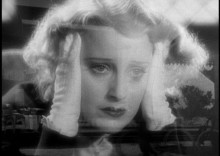
Now, none of this means that I have the least doubt that Love Me Tonight is one of the great films. That, I think, is demonstrable on the level of filmmaking. I think it’s demonstrable even if you’re one of those people who simply “hates” all musicals. (The film’s own acceptance of the basic absurdity of the form usually goes a long way toward smoothing that over.) But do I think anyone is going to respond to it with all the backlog of the experience of the film over the past 39 years? No. That would be absurd, but I have no desire to personally set that apart from the movie, nor am I convinced that it would be desirable for me to do so.
Our relationships to movies tends to change over the years. Appreciation can increase or decrease with the passage of time. The films may not change, but we inevitably do—or at least most of us do. (I suspect those words will seem less true to younger readers—and I won’t press it, because I refuse to play the arrogant “you’ll understand one day” card.)

And it’s not entirely limited to first exposures. The other night we screened Dario Argento’s Phenomena (1985) for the Thursday Horror Picture Show. I’ve always liked the film because of its incredibly screwed-up quality, but I’ve never been morbid about it. It was chosen because people had asked for some “Euro-horror,” which almost invariably means Italian horror. Before the movie, someone pulled up in a car while I was standing in front of the theater and yelled out, “Argento at eight?” I admitted that this was indeed so. I may not get the appeal, but it’s there.The showing itself—with about a third of the audience identifying themselves as hardcore Argento fans—was interesting and enlightening. Seeing the movie with an audience that laughed at some of the silly acting, the hokey effects, and the downright weird touches wasn’t exactly revelatory, but it enhanced the experience. The crowd breaking into applause at the sight of the simian ex machina climax, however, sealed the deal. Do I like the movie more or think it’s good in the “normal” sense now? No, but that experience is now part of my concept of it. Is that wrong?




For those of you who were wondering where this was — and since a few asked, I know there were some — there were some technical issues this weekend.
How does that scene go again? “Americans admire the stupidest Frenchmen, Lafayette and Maurice Chevalier”
How does that scene go again? “Americans admire the stupidest Frenchmen, Lafayette and Maurice Chevalier”
I have no idea what scene from what you’re in reference to, but it obviously is coming from a point of utter ignorance.
I’ve seen “Dr Strangelove” a dozen times. The third time I saw it was at a theater in 1980 in Hollywood that screened older movies. During one scene Keenan Wynn identifies himself as “Col ‘Bat’ Guano”. I’d forgotten this joke and laughed uproariously. The other hundred people or so in the theater were silent. Apparently few people knew what the word “guano” meant. I’ll bet even fewer people know it today. I can’t watch “Dr Strangelove” now without recalling that experience. Such experiences do at least expand the movie experience and make it more memorable. I don’t think it’s really possible to ignore or forget these influences so I may as well go with the flow.
The other hundred people or so in the theater were silent. Apparently few people knew what the word “guano” meant. I’ll bet even fewer people know it today.
I can relate, though not to the specific instance. I remember seeing South Park: Bigger, Longer, Uncut in a theater with a couple of friends in a pretty packed auditorium. When Elton John’s piano came up out of the floor, the three of us laughed at the name — “Felcher and Sons” — emblazoned on it as the makers. Everyone else looked at us in mystification. Though the term has come into greater general knowledge, it was very obscure at the time. (I’m sure a lot of people are heading for the urban dictionary even now.) It’s at least become sufficiently known that it got pulled from a review I wrote a few years back. (I think it had made it through once before — and then the publisher looked it up.)
That’s what Jean Paul Belmondo’s character says in Breathless who else would write something like that but Uncle Jean.
That’s what Jean Paul Belmondo’s character says in Breathless who else would write something like that but Uncle Jean.
It doesn’t make it profound, nor does it mean that it presents either Belmondo’s or Godard’s point of view — only that of the character. You can turn it on itself by noting that Frenchmen admire the stupidest of Americans like Jerry Lewis.
He was good in King Of Comedy though.
He was good in King Of Comedy though.
Which has absolutely nothing to do with the French reverence for Lewis’s work.
I thought you said the French like Jerry Lewis.
I thought you said the French like Jerry Lewis.
I’m hoping you’re being willfully obtuse, but in case you’re not — the French admired Lewis long, long before The King of Comedy and that admiration has nothing to do with The King of Comedy.
I know but that’s just one i can agree with them on.
I know but that’s just one i can agree with them on
But you’re not because it has nothing to do with the worship of Lewis the auteur who represents America’s “collective consciousness.” To agree with that you need to be talking about Cinderfella or The Ladies’ Man or The Errand Boy, etc.